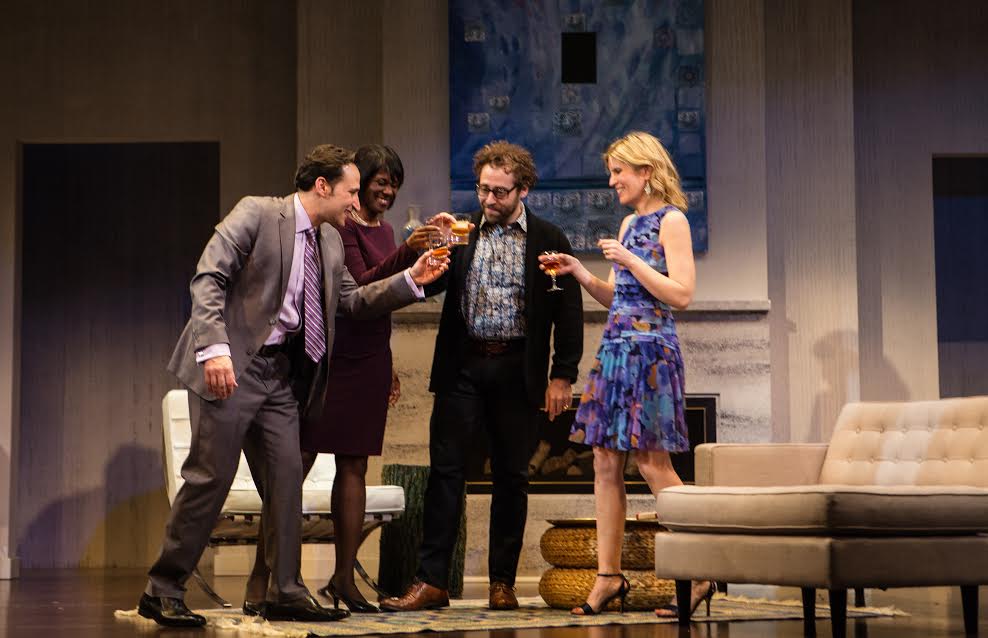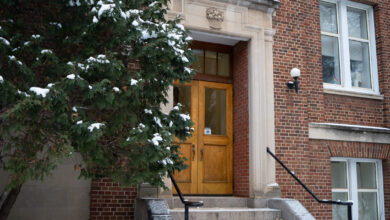Why politics and religion should be discussed at the dinner table
 Photo Credit: Cylla von Tiedemann
Photo Credit: Cylla von Tiedemann Ayad Akhtar’s Pulitzer Prize winning play Disgraced is a story of how a dinner party, hosted by a lawyer of Pakistani heritage named Amir and his artist wife Emily goes array after the sensitive topic of religion and politics comes up in the discussion. The show, despite many claims that it would make its audience uncomfortable, left many individuals who identify as Muslim, including myself, rendered speechless and defensive towards their heritage.
The best word to describe my initial reaction after seeing the play is dumbfounded. I was shocked, I was offended, I was outraged. The implication at the end of the play that out of the two Muslims represented, one was an anti-Semitic, abusive husband and the other was a radicalist, full of rage towards white Americans. I was terrified that many of those who have seen the play will feel justified in their beliefs after, with the confirmation that Muslims “were just raised that way, they can’t help it.” The play itself made it so easy for individuals who are already suspicious of Muslims to delve into their suspicions even more, as now they feel as though they “understand” why they are suspicious and can explain any Islamophobic thoughts they may have.
Although I still disagree with the way they chose to portray Muslims, I can understand why Akhtar chose to illustrate Muslims in this light. This “exaggerated” portrayal of Muslims isn’t really an exaggeration at all, because for many, it is it not truthful display of Muslims. The play itself is not even about Islam, but about segregation, of how we have created a societal division that is so blatant as it is subtle. Every single character in this play views the same religion, Islam, differently, whether it’s through a lens of beauty or a lens of violence associated with it. To a certain extent, none of these perspectives are true, but none are false, as it depends on your interpretation of the religion — a reality that can be applied in any situation.
The play did hold some truths that are extremely relevant to the views post 9/11. Hussein’s rage at the end of the play, the rage he feels from being shunned by the predominantly “white” community in America, was a tribute of sorts to the perceptions Muslims faced throughout America for something as simple as their background. Not only were the attitudes towards Muslims emotionally and physically traumatizing for many, but the American government and the Central Intelligence Agency launched a series of interrogations where many innocent Muslims, who were assumed to be members of Al-Qaeda, faced questioning and abuse, furthering their sense of isolation in America. Even now, with Donald Trump’s recent executive order to ban all Muslims from America, or the shooting that took place about a week ago in a mosque in Quebec, many Muslims feel as though they are perceived as “others,” as those who do not being in a Western society.
These perceptions are the reason, in my opinion, as to why this play hit a sore spot for many Muslims. The history of how Muslims were treated in the West is a sensitive topic, and because it is so important, now more than ever, to reduce the stigma against Muslims, the portrayal of Islam in Disgraced heightens that tension.
So maybe that’s what the play is about: the perceptions of Muslims, specifically in the West. This representation is just one of millions, as each individual regards their faith differently. Amir doesn’t represent all Muslims; he’s just one man who is trying to reject his religion as a survival tactic in a society that sees all Muslims as terrorists.
Despite the blatant demonstration of stereotypes, at the risk of confirming prejudices against Muslims as I thought it might, Akhtar paves a way to a more honest discussion of what it really means to be Muslim in today’s society. Instead of telling us to think, Akhtar questions how we are thinking, challenging many to feel discomfort not necessarily because of the play, but because of our own thoughts. I may still not agree with the play’s illustration of Muslims; however, I understand why Akhtar “played” out the story as he did. The play’s purpose was to create a dialogue between each other, to talk about these perceptions and these issues, and to think about how we think. And I think Disgraced did exactly what it was intended to do.





Calling people Islamophobic halts dialogue. Complete dishonesty about the nature of Trump’s travel ban executive order halts dialogue. Being more concerned about some people’s feelings who were suspected of being terrorists than you are about actually stopping the ideology that made the terrorists halts dialogue.
Well the author singly didn’t call anyone Islamaphobic, they just assumed that people can have Islamaphobic thoughts regardless if they were prejudiced or not. And you claiming what you’re claiming also halts dialogue. Having a bunch of people getting held at the airport with no access to lawyers (obviously not by Trump’s order but due to hasty passing of a confusing policy) also halts dialogue. You’re right about it not being a Muslim ban but I argue that he structured and released it this way so that he can distract people further from his shady ass deals with actual insane countries like Saudi Arabia. He effectively has disrupted dialogue by banking on the media to report sensationally rather than truth with a massive amount of sheep listening. And your last point doesn’t make any sense. Why would and how could anyone be responsible for shutting down an ideology that you claim makes terrorists? Simply making these assumptions definitely stops discussions also whilst listening to how people’s lives change due to suspicion definitely opens dialogue further (if not too far that any claims become trivial). I’m just happy no one with an actual opinion responded to you, I’m just a contrarian.
Hey, Sam. Your inability to speak coherently is a serious impediment to those trying to understand you.
My point remains that the author was completely dishonest about the nature of the EO (called it “Trump’s recent executive order to ban all Muslims”). With regards to the implementation of the policy, I concede that it was done poorly; but, we have to be honest in our terminology before we can have a conversation.
I can’t decipher the rest of your points. If you have the opportunity in the future to state them more clearly, I would be happy to respond to them.